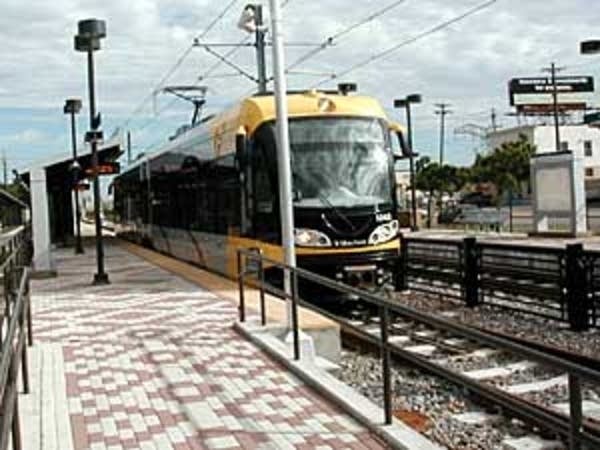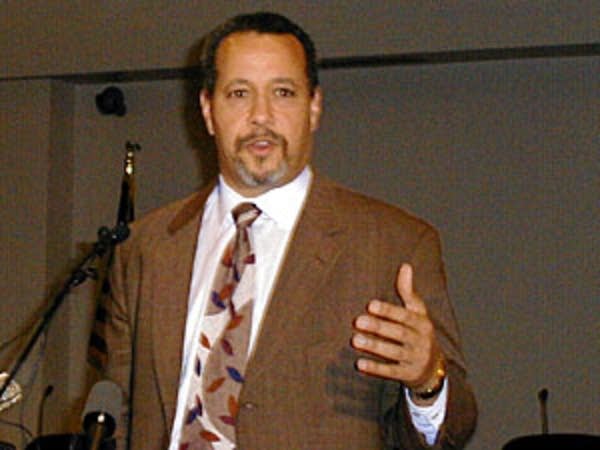Pawlenty delivers a setback to the Central Corridor project
Go Deeper.
Create an account or log in to save stories.
Like this?
Thanks for liking this story! We have added it to a list of your favorite stories.

The governor's actions Monday prompted a swift rebuke from St. Paul Mayor Chris Coleman, lawmakers and the business community.
While they are hopeful funding can be restored, one of the chief advocates for the Central Corridor project thinks it will be hard to undo the governor's actions.
State Rep. Alice Hausman, DFL-St. Paul, said she can't help but take Pawlenty's actions personally.

The governor signed the bonding bill, but he used his line-item veto power to strike down more than 50 projects, many of them from St. Paul.
Turn Up Your Support
MPR News helps you turn down the noise and build shared understanding. Turn up your support for this public resource and keep trusted journalism accessible to all.
Hausman is the lead bonding negotiator for the House. While light rail advocates are hoping lawmakers can resurrect the project in a new bonding bill, Hausman said it isn't likely.
"It's done. I mean, this was the bill. Because once you pass everything for greater Minnesota, we don't have 81 votes to pass anything anymore," said Hausman. "That's the whole point of a bonding bill. You keep the whole package together, and that's how you get 81 votes. There's no way you're going to get 81 votes for the Central Corridor. It just doesn't happen that way."
Hausman is pessimistic that there's enough support to get the three-fifths vote needed in the House to override the governor's veto.

She said Pawlenty himself may not have understood the consequences of his actions.
"That's the terrifying thing for those of us who know this is real, and he has blown it. He has just blown it for the Central Corridor," Hausman said.
The governor vetoed St. Paul projects ranging from an expanded Como Zoo gorilla exhibit to a new Asian cultural center.
"The governor line-item vetoed the Capital City today," St. Paul Mayor Chris Coleman said.
"His actions should outrage everyone in the city of St. Paul, and everyone in the state of Minnesota who cares about their Capital City," he added.
Coleman and other elected officials point out that the governor himself recommended $70 million for the Central Corridor in his initial bonding request.

When Pawlenty voiced concerns about the cost, Coleman notes that local agencies, along with business leaders and other partners, took pains to find compromise.
"There's such wide support for this project, which is why the governor's action today is so stunning. And if he has an end game in mind, I wish he'd declare what that is so we can all get together and come to some agreement," Coleman said. "But the same governor who rails against political gamesmanship is playing the worst kind of it."
Kris Johnson of the St. Paul Area Chamber of Commerce said he plans to call an emergency meeting with Central Corridor stakeholders this week, and will request a later meeting with the governor. He's hopeful legislators can salvage the funding in a new bonding bill.
"This is the time when we've got to lock our arms and work together as a team to get the project done. If we don't, the project won't happen," Johnson said.
Mayor Coleman, in his mind, won't even allow for the possibility of losing the $70 million this session. He said even delaying the project by a year could add more than $40 million to the total price tag because of inflation.

Light rail supporters have described 2008 as the do-or-die year for Central Corridor. They assumed they would secure the local dollars needed for a federal funding application this fall.
But Pawlenty had made clear his objections to the $925 million bonding bill, saying it was way too high. He echoed those frustrations when he explained why he struck the Central Corridor from the list.
"Before we sign up for the next phase of this big mammoth transit project on University Ave., that's going to cost total of $1 billion plus operating costs, I want to make sure I've got a Legislature that's willing to stay focused, be fiscally disciplined, set priorities and solve this budget crisis in a fiscally disciplined way," Pawlenty said. "And if this bill is any indication of how they're going to behave, then I think we're in trouble on this project."
Pawlenty left open the possibility for another bonding bill, but at other times, he said he was done negotiating.
Metropolitan Council Chairman Peter Bell interpreted Pawlenty's comments in a positive light. In a statement, Bell said the project was not derailed.
"The governor remains open to funding on this project, but wants to see how the Legislature intends to fit it within the state's budget priorities," Bell said.
Bell said the Met Council will continue its work on preliminary engineering and will apply for federal approval to enter final design this fall.




